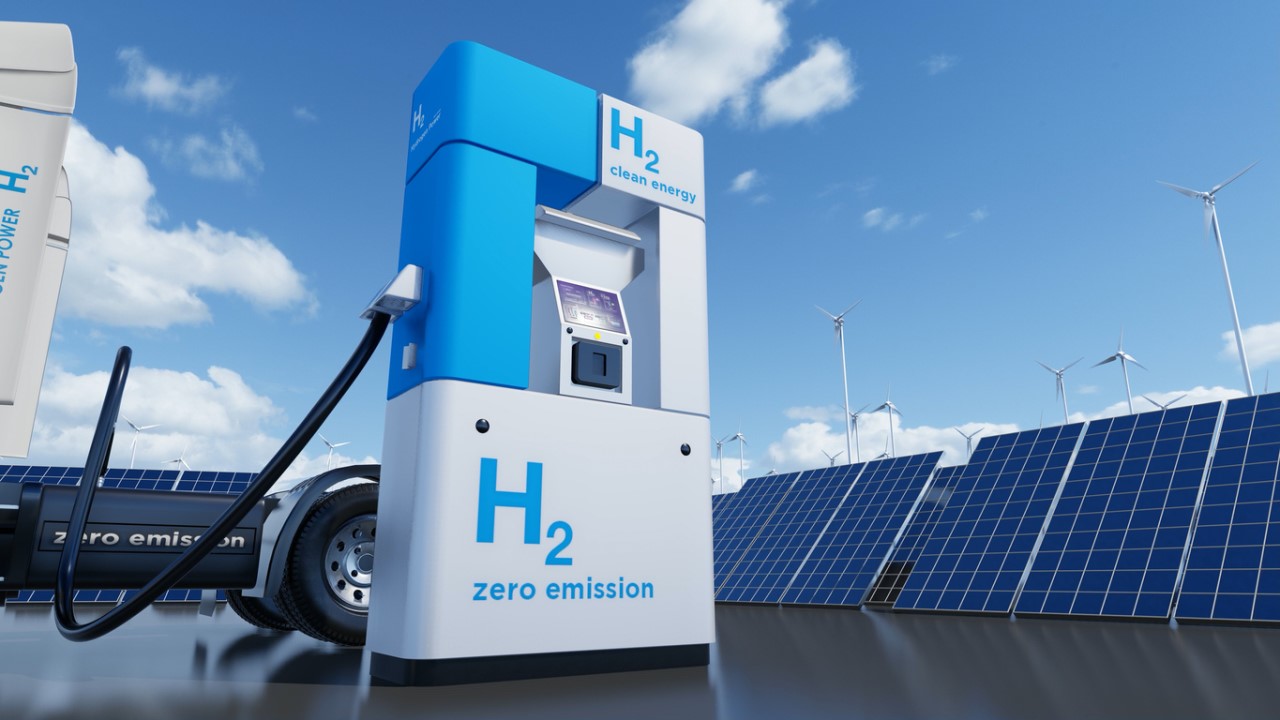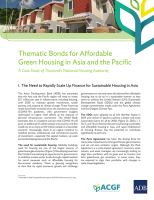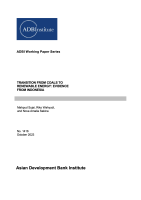Can Green Hydrogen Help Indonesia Meet Its Net-Zero Goals?

Research Associate, Economic Research Institute for ASEAN and East Asia (ERIA)

Energy Economist, Economic Research Institute for ASEAN and East Asia (ERIA)

Hydrogen technology in Indonesia remains in the pilot research project stage. Photo credit: iStock/UniqueMotionGraphics.
Hydrogen power could play an important role as an alternative to fossil fuels and can be employed across industries, power generation, and transport.
This article is published in collaboration with the Economic Research Institute for ASEAN and East Asia.
Climate change and the energy transition have made research and development in clean energy a priority as countries aim to reach net-zero in the next decades. Hydrogen, singled out as a possible source of energy in the not-too-distant future, has emerged as a primary focus of discussion on the transition to sustainable energy. It has been widely used for many applications including refining ammonia and petroleum, and production of methanol and synthetic fuels. These applications accounted for more than 93% of global hydrogen consumption in 2020. In ASEAN countries, hydrogen is mostly utilised for fertilizer in agriculture, and in methanol production, the steel industry, and oil refining. However, most hydrogen in use in the world today is not "green" hydrogen, which is produced from renewable resources.
To achieve a sustainable and resilient net-zero future, ASEAN member states must aggressively promote the use of renewable energy sources, energy efficiency, and the shift to cleaner fuels. Along with the adoption of clean technologies, the use of new energy technologies such as carbon capture, usage, and storage and hydrogen should be implemented. Hydrogen technology could play an important role as an alternative to fossil fuels and can be employed across industries, power generation, and transport.
Several nations have begun implementing their own hydrogen strategies. According to a study conducted in 2020 by the Economic Research Institute for ASEAN and East Asia (ERIA), since late 2019, Brunei Darussalam has been supplying liquefied hydrogen to Japan as a pilot project. In the same year, Malaysia built Southeast Asia’s first integrated hydrogen production plant, refuelling station, and hydrogen fuel cell-powered buses for public use in Sarawak. These have propelled both countries to the forefront of the ASEAN hydrogen economy.
Clean but expensive
But green hydrogen production is expensive compared to other forms of hydrogen. For example, Brunei Darussalam and Indonesia can manufacture gray hydrogen—derived from natural gas and produced from fossil fuels—at about $5 per kilogram, the world's most cost-effective rate, according to the ASEAN Centre for Energy Report in 2021. In comparison, the production cost for green hydrogen in all member states is high, given the upfront investment for electrolyzers and the high cost of renewable electricity, but the examples cited above demonstrate that Brunei Darussalam, Malaysia, and Indonesia have the potential to develop green hydrogen.
In October 2022, ERIA hosted the East Asia Summit (EAS) Hydrogen Workshop, where speakers and panelists from Australia, Brunei Darussalam, People's Republic of China, India, Indonesia, Malaysia, New Zealand, and the International Renewable Energy Agency discussed the issues and challenges in developing hydrogen, and how EAS countries could learn from technology pioneers such as Japan, which has already established a hydrogen-receiving port and a hydrogen-fired power plant in Kobe. Particularly for the ASEAN countries, it is an important step toward strengthening regional collaboration among EAS nations.
In Indonesia, in 2020, Energy and Mineral Resources Minister Arifin Tasrif acknowledged the challenges faced by the country in adopting hydrogen, including finding ways to make the use of hydrogen economically feasible, financially appealing, and socially beneficial. According to a report by the International Energy Agency on Indonesia’s Net-Zero Strategy 2060, the country will utilize hydrogen by 2050, aimed at reducing by a quarter its emissions through several technologies, including use of hydrogen and hydrogen-based fuels. As the report indicated that the cost of making hydrogen from renewable sources is going down, this could boost large-scale hydrogen production in ASEAN.
Going beyond the pilot phase
Hydrogen technology in Indonesia remains in the pilot research project stage. During Indonesia’s Group of Twenty (G20) presidency in 2022, sessions were devoted to examining the potential of a hydrogen market in the country. Recently, PERTAMINA, Indonesia's state oil and gas company, announced its plans to start producing green hydrogen fuel for the Ulubelu geothermal site in 2023, with a daily production rate targeted at 100 kg.
Even though the plans to develop green hydrogen in Indonesia have been in place in recent years, challenges remain, such as developing hydrogen-specific regulations, lowering the cost of green hydrogen production from low-carbon energy sources, the slow development of hydrogen infrastructure, and hydrogen supply remaining primarily derived from natural gas and coal.
Policy approaches are imperative to overcome the challenges and build the hydrogen market in the country. Key aspects that need to be considered in unlocking Indonesia’s hydrogen potential include:
- Establishing a national hydrogen strategy and policies to spur private sector investment in hydrogen infrastructure. A carbon tax policy could be implemented to phase out fossil fuels and boost green hydrogen production, storage, and transport capacity.
- Developing potential market and demand to ensure the production cost of green hydrogen is more competitive. Once affordable, this technology can open worldwide markets and solve hydrogen supply chain issues.
- Starting the greening process of hydrogen in industries that already rely on hydrogen, such as those refining and manufacturing ammonia and methanol, is more likely to be cost-effective and less vulnerable to uncertainties.
- Launching green hydrogen pilot projects, such as producing it from the surplus electricity generated by variable renewable resources including solar photovoltaic and wind. In this production pathway, hydrogen plays the role of battery, thus facilitating penetration of variable renewable electricity.
The development of hydrogen-related infrastructure projects is a necessary step in a decarbonizing economy. Access to technology, research and development, training, capacity building, and affordable financing might be key to realizing hydrogen's full potential. If the Government of Indonesia takes into account the above points, hydrogen could be used to help Indonesia and ASEAN reduce carbon emissions and realize the goal of carbon neutrality.
This opinion piece was first published by the Bangkok Post on 30 January 2023.

Citra Endah Nur Setyawati
Research Associate, Economic Research Institute for ASEAN and East Asia (ERIA)Citra Endah Nur Setyawati joined ERIA in July 2021. She is currently involved in research on low-carbon green growth in Asia and carbon capture, utilization, and storage. Before joining ERIA, Citra was involved in several projects in the field of environmental education. She graduated from Lund University in Sweden with a master's in Environmental Studies and Sustainability Science.

Alloysius Joko Purwanto
Energy Economist, Economic Research Institute for ASEAN and East Asia (ERIA)Alloysius Joko Purwanto obtained his doctorate degree in Economic Sciences from Université Lyon II in France. After his studies, he joined the European Commission's Joint Research Centre in Seville, Spain for 3 years as researcher. He then worked at the Transport & Mobility Leuven, a research company based in Belgium, where he stayed for almost 10 years as senior researcher.

ERIA (Economic Research Institute for ASEAN and East Asia)
ERIA is an international organization that was established in 2008 by an agreement of the leaders of 16 East Asia Summit (EAS) member countries. Its main role is to conduct research and policy analyses to facilitate ASEAN Economic Community (AEC) building and to support wider regional community building.

